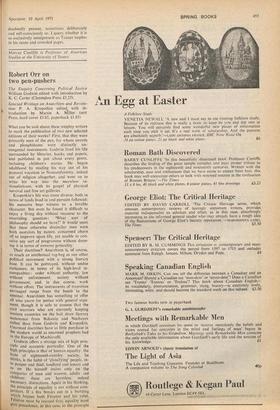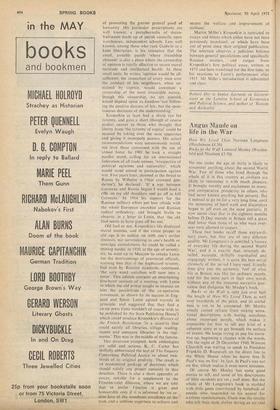Robert Orr on two pen-pushers
The Enquiry Concerning Political Justice William Godwin edited with introduction by K. C. Carter (Clarendon Press £3.25) Selected Writings on Anarchism and Revolu- tion P. A. Kropotkin edited, with in- troduction by Martin A. Miller (MIT Press, hard cover £5.85, paperback £1.85) What can be said about these weighty writers to mark the publication of two new selected editions of their works? First, that they were primarily men of the pen, for whom swords and ploughshares were distinctly un- congenial instruments. Godwin lived his life surrounded by libraries, books and papers, and published in just about every genre, including children's stories. He began adulthood by reading his way out of his pastoral vocation in Nonconformity, indeed out of religion altogether, and went on to write his way into the saeculum ra- tionalisticum, with its gospel of physical survival and free art galleries.
Kropotkin's life was more diverse, both in terms of lands lived in and pursuits followed; his memoirs bear witness to a lovable character. But even he found it difficult to enjoy a living day without recourse to the overriding question: `What sort of philosophy should we have?' It would seem that these otherwise dissimilar men were both moralists by nature. concerned above all to improve upon life, yet unable to con- ceive any sort of programme without dress- ing it in terms of extreme generality.
Their doctrines? Anarchism is, of course, as much an intellectual rag-bag as any other political movement with a strong literary base. It can be portrayed, without undue caricature, in terms of its high-level in- compatibles: order without authority, law without enforcement. society without government, and, in due course, work without effort. The instruments of transition envisaged range from the bomb to the seminar. Anarchism has something to offer all who yearn for justice with general argu- ment, though it is safe to assume that the civil warriors who are currently keeping western countries on the boil draw literary sustenance from Bakunin and Nechayev rather. than from Godwin and Kropotkin. Unarmed doctrines have as little purchase in the modern world as unarmed prophets had in the Europe of Machiavelli. Godwin offers a strange mix of high prin- ciple and eccentric particular. One of the high principles is that of human equality. the bane of eighteenth-centdry . society, he thinks, is the habit of 'classifying' people. in- to pauper and thief, landlord and tenant and so on. He himself insists only on the categories of men and women, adults ,ind children: these are harmless, indeed necessary, distinctions. Again in his thinking, the principle of equality is not without com- petitors. If a fire breaks out in a building which houses both Fdnelon and his valet, Fdnelon must be rescued first; equality must give precedence, in this case, to the principle
of promoting the greater general good of humanity. His particular prescriptions are well known; • a paraphernalia of decen- tralisation made up of parish councils, open warehouses, independent schools. Less well known, among those who rank Godwin as a keen libertarian, is his insistence that the small, amiable parish 'where friendship abounds' is also a place where the censorship of opinion is totally effective to secure moral rectitude and intellectual health. In these small units, he writes, 'opinion would be all- sufficient; the inspection of every man over the conduct of his neighbours, when un- stained by caprice, would constitute a censorship of the most irresistible nature,' though this censorship, we are assured, would depend upon its freedom 'not follow- ing the positive dictates of law, but the spon- taneous decisions of the understanding.'
Kropotkin at least had a sharp eye for tyranny, and gave a short (though of course prolix) answer to those who thought that liberty from 'the tyranny of capital' could be secured by taking over the state apparatus and giving it monopoly powers. His actual recommendations were uncommonly mixed, not least those concerned with the use of armed force. In 1901 he took a straight pacifist stand, calling for an international federation of all trade unions, 'irrespective of politiCal opinions and nationality', which would stand united in participation against war. Five years later, alarmed at the threat to Russia by Wilhelm it ('that crowned gen- darme'), he declared: 'If a war between .Germany and Russia begins I would haul a rifle on my old shoulders and go off to kill Germans.' In 1914 his support for the Russian military effort put him offside with the whole European anarchist and Russian radical orthodoxy, and brought Stalin to observe, in a letter to Lenin, that 'the old fool seems to have gone off his nut.'
Old fool or not, Kropotkin's life displayed moral stamina, and if the virtue proper to old age is to soldier on with one's earlier interests, not surrendering to one's health or nostalgic consolations, he could be called a shining model. In 1920, at the age of seventy- six, he went up to Moscow to rebuke Lenin for the shortcomings of provincial officials, warning him that if the haphazard tyranny, bad even by Russian standards, continued, 'the very word socialism will turn into a curse'. This edition contains an entertaining first-hand account of a meeting with Lenin in which the old prince sought to impress on him the possibilities of the co-operative movement, as shown by its success in Eng- land and Spain. Lenin agreed warmly in principle, and suggested that they find a co-op press you wouldn't of course wish to be published by .the State Publishing House')
which could produce Kropotkin's History of the French Revolution 'in a quantity that could satisfy all libraries, village reading-
rooms and company libraries in the regi- ments.' This was in the middle of the famine. This diversion excepted, both anthologies are solid and serious. K. C. Carter has
skilfully abbreviated the text of The Enquiry Concerning Political Justice to about two- thirds of its original prolixity. The result is
an economical package of doctrines which should satisfy any proper curiosity in that direction. There is also a short appendix of essays. notable for a supplement to the Fenelon-valet dilemma, where we . are told that to prefer Fenelon is great and honourable only if it is informed by 'an ar- dent love of the wondrous excellence of the man, and a sublime eagerness to achieve and secure the welfare and improvement of millions'.
Martin Miller's Kropotkin is restricted to essays and letters which either have not been previously translated, or which have been out of print since their original publication. The selection observes a judicious balance between general speculations and specifically Russian matters, and ranges from Kropotkin's first political essay, written in 1873 and here translated for the first time, to his reactions to Lenin's performance after 1917. Mr Miller's introduction is substantial and clear. .
Robert Orr is Senior Lecturer in Govern- ment at the London School of Economics and Political Science, and author of 'Reason and Authority'











































 Previous page
Previous page